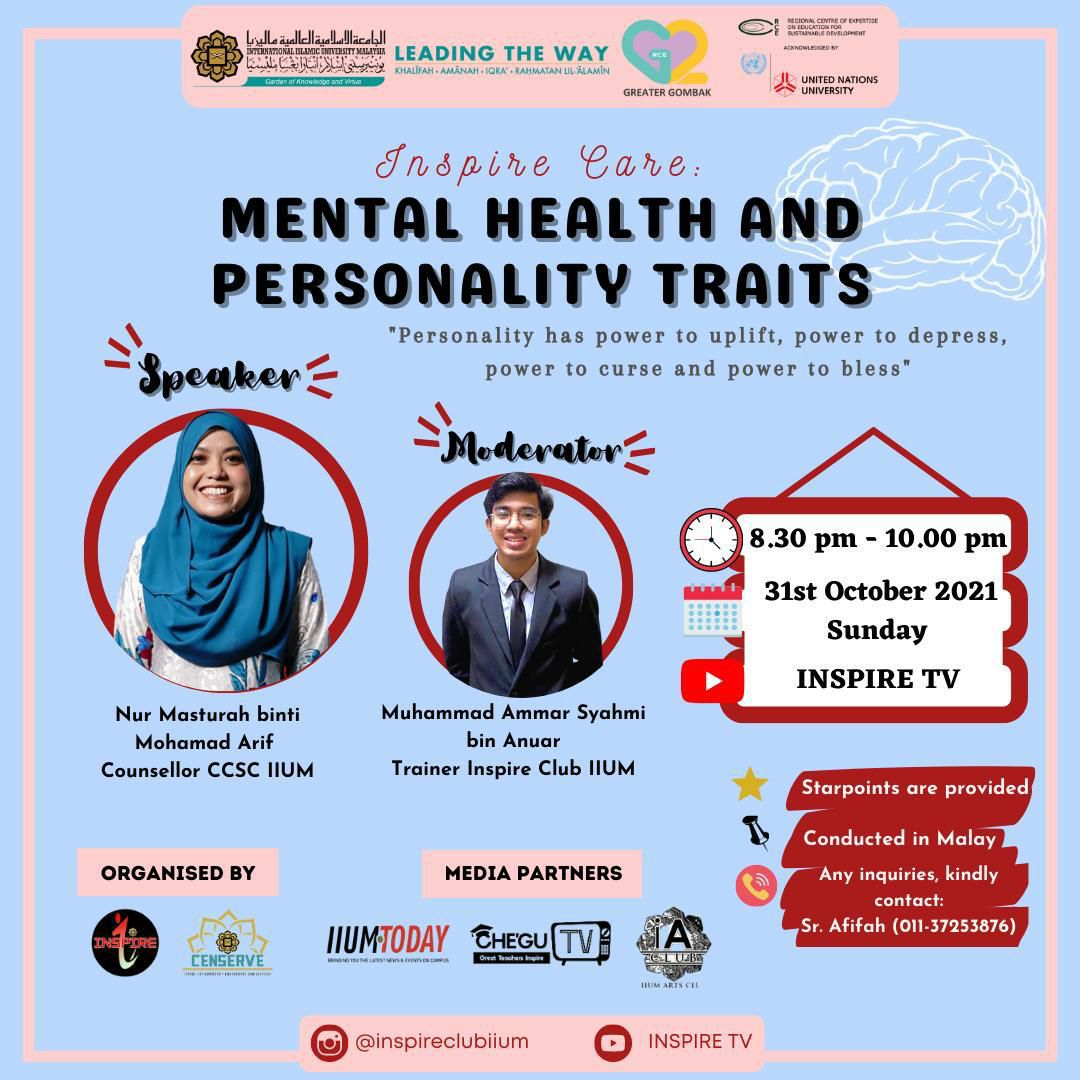By Husna Fathiyyah
GOMBAK, 2 November 2021: The key to stress management may come from possessing a high self-awareness, according to a counsellor, Nur Masturah binti Mohamad Arif.
She said the symptoms of stress are changes in both physical health and emotional stability, where affected individuals are likely to get sick often and become more agitated or emotional than normal.
Nur Masturah binti Mohamad Arif from Counselling and Career Services (CCSC IIUM) was sharing valuable information with students on stress management during a webinar titled “Inspire Care: Mental Health and Personality Traits” on Sunday (31 October).
The webinar was aimed to help students understand in detail about their personality and mental health.
She said an individual with rich self-awareness who constantly analyse the changes in their body will be able to manage stress better.
To help enforce self-awareness, Nur Masturah recommended journaling to record our lifestyle patterns. Any changes to our lifestyle will easily be analysed, thus increasing our self-awareness when we analysed them.
Personality is defined as “human interaction towards external stimulus in the form of physical, emotional or thinking pattern.”
Many are used to label someone’s personality as good or bad, but for Nur Masturah she has a different opinion.
“Personally, I welcome all kinds of personality as I am exposed to clients who have their own characteristics,” Nur Masturah clarified adding that “it is the behaviour or thinking pattern that needs to be changed as there is no such thing as a ‘bad’ personality.”
Acknowledging the popularity of personality test, Nur Masturah reminded that personality test should not be used to label people. However, she explained that it is helpful in understanding one’s character.
By having a basic idea on one’s personality, a person is able to understand oneself more, which is helpful in various aspects, including academic performance and stress.
Nur Masturah demonstrated how physical health can be affected by stress.
“I like to assess the clients’ physical condition such as their bowel movement. Stressed individuals usually forget to drink a lot of water, causing their body to be dehydrated, resulting in constipation or small bowel movement.”
Physical symptoms of stress can also manifest in the form of unhealthy interpersonal relationships. Usually stressed individuals will find themselves experiencing an increase in disagreements and conflicts in relationships.
However, these symptoms are often overlooked by high functioning individuals. They are individuals who are set in their goals and highly engaged with their work.
As work takes the utmost priority, they usually ignore the changes in their body or surrounding.
According to Nur Masturah, people often want to help struggling individuals. For that, she suggested individuals to communicate these patterns to their loved ones and help them take care of each other’s physical and emotional needs.
“Tell your loved ones to take note of these patterns, and say, ‘I would really appreciate it if you could reach out to me’ (when I’m doing certain patterns due to stress).”
If you are not sure with your struggles, it would be best to talk them out with a friend or a professional.
“We may not notice our main struggles, but our friend does.”
“This is a form of self-care.” She also mentioned the importance of hydration in battling stress. As individuals take their time to drink water, it will improve their physical health, reducing the toll of stress on their body.
The term ‘mental health’ and ‘mental illness’ are used interchangeably among the public. However, it is important to note that clinical diagnosis such as depression and anxiety are mental illness, while mental illness and stress are in a category under mental health.
One may be exposed to a minimal amount of stress, however if the exposure is prolonged, it could affect the stability of mental health. Therefore, Nur Masturah recommended for individuals to not ignore their problems.
“Do not normalise saying ‘ah, this (stress) is nothing. It’ll get better over time‘”. “The question is, when will it get better?” Nur Masturah asked.
However, she also reminded to not hyperfixate on a problem without rest.
“Imagine you’re holding a cup for three hours. It will feel heavy. The weight of the cup remains the same, but your hand has already reached its capacity. So, do remember to put the cup down. When it’s time, pick up the cup again.”
This webinar was organised by INSPIRE Club IIUM, and moderated by Ammar Syahmi, a trainer with INSPIRE Club.
Readers can watch the recorded webinar at INSPIRE TV YouTube Channel https://youtu.be/osWUUmmF0nw.***
